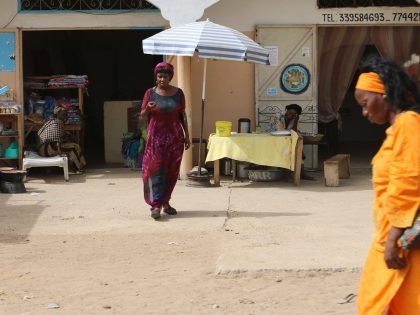Postfeminism is only for wealthy Nigerian women
To have—or, at least, claim—a sense of self that is “already empowered” or happily unencumbered by power relations, requires a fair bit of material privilege.

Deola RTW, NY Fashion Week 2014. Image credit James Nova via Flickr CC BY-NC-ND 2.0.
Simidele Dosekun’s new book, Fashioning Postfeminism: Spectacular Femininity and Transnational Culture, is about young, class-privileged women in Lagos who wear—to a spectacular degree and in spectacular combination—weaves and wigs, false eyelashes and false nails, heavy and flawless makeup, and the highest of heels. This “spectacularly feminine style,” as she calls it, has been growing in visibility and popularity in Nigeria for about the last 15 years. It dominates Nigerian popular media, from Nollywood stars and other celebrities, to glossy women’s magazines, to the looks curated by sites like bellanaija.com and other accounts on Nigerian social media. Unsurprisingly, it is also the style of brides and other women at the most “fabulous” Nigerian weddings. Based on interviews with 18 women in Lagos who dress broadly in this style, Fashioning Postfeminism is concerned with the accompanying senses of identity and self being fashioned and communicated. The book argues that the women see themselves in “postfeminist” terms: as “already empowered” and even “self-empowering.” Donning a style of dress that promises self-confidence by way of normative feminine beauty, these women see themselves as individually beyond the need for feminism as collective politics and struggle.
In the following conversation, Grace Adeniyi-Ogunyankin and Simidele Dosekun discuss and reflect upon Dosekun’s book. Their conversation comes out of a wider panel discussion at the 2021 Lagos Studies Association Conference.



